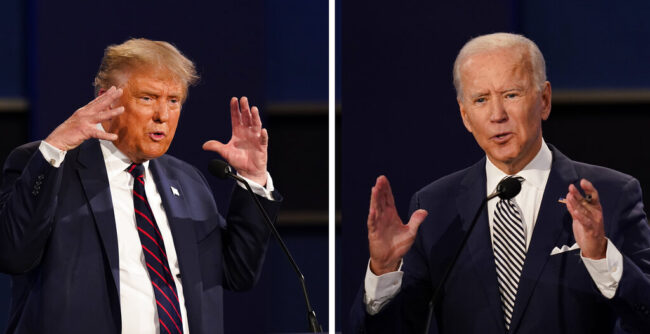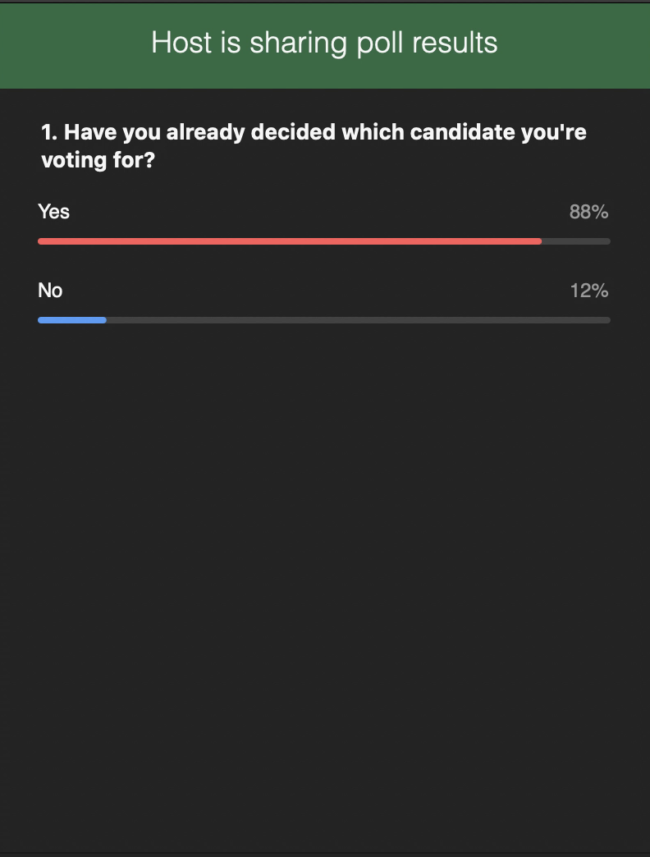UCO Speech and Debate team discuss presidential debate
Abbas Rastakhiz quickly spotted a familiar debate tactic used by President Donald Trump during a virtual watch party Tuesday hosted by the Speech and Debate Team at the University of Central Oklahoma.
Rastakhiz, American national government professor at UCO labeled which tactics stood out to him as most persuasive or repulsive.
“I think it’s more a distraction strategy that Trump uses to avoid the question and throw it at someone else and put the spotlight on someone else because he’s cornered,” Rastakhiz said.
“If you’ve been following Trump since 2016 or 2015 basically, this is his debate tactic. When he is cornered he just immediately throws something more colorful at you even if it’s not true. It will at least divert attention as a strategy,” Rastakhiz said.
Students participated in a live chat during the debate. The comments were informal and fluid. The more structured analysis took place afterward the team specifically broke down each topic discussed during the debate.
For example, the persuasiveness of the arguments made by the candidates under the COVID-19 section of the debate.

Matthew Moore, Debate Team coach at UCO, led the discussion after the debate. He introduced why the nomination of the Supreme Court was so important to this debate and spoke about former Vice President Joe Biden’s reaction to the distraction strategies.
“It seemed there were places where Biden was losing traction,” Moore said.
“As a result of the Trump distraction strategy that Abbas talks about, he was doing this to Biden by constantly harassing him so he would lose train of thought, so he would misspeak, so he would take missteps. At the end, he got Biden to misspeak and say he supported the New Green Deal,” Moore said.
“So if you notice, how much of that strategy was in place — get Biden to commit to things that would alienate the left because there’s no chance those people would vote for Trump. … Everytime he could do that, he pounced on it,” Moore said.
Another example of that was when Trump brought up Biden’s controversial 1994 crime law that many say resulted in mass incarceration of Blacks.
The Commision on Presidential Debates says it will add new “tools to maintain order” to the upcoming debates after a chaotic first contest between President Donald Trump and Democratic nominee Joe Biden, according to The Associated Press.
Leigha Maddy, assistant debate coach at UCO, compared the candidates debate tactics through the COVID-19 section of the debate.
“Joe Biden was really taking a grounded emotional approach to rebutting those arguments that Trump was making about a theoretical world that might exist. Where Joe Biden’s administration would be in charge of the pandemic comparable to COVID, or if he was in charge of the COVID epidemic what would that world look like? And Trump argues, arguably worse, right?” Maddy said.
Maddy said Joe Biden responded that the core of Trump’s arguments isn’t based in reality by reminding voters, “let’s take a look at the reality.”
When Biden spoke about the American lives lost to COVID-19, he appealed directly to the heart of the voters. He asked voters to imagine they’d lost a family member or to imagine an empty seat at the table.
Maddy explained this is a type of rhetorical strategy that presidential debates can take.
“Along these kind of classical like logos, pathos, ethos style argument; where you’re appealing to this type of logic to this type of argument, where you’re appealing to the emotional core type of argument or you’re appealing to a type of persuasion strategy, right? Biden there, I think, is recalling a different type of debating than Trump is doing which can be effective for some voters and maybe ineffective for other voters,” Maddy said.
STLR credits are available for those who attend the watch parties. One will be held for each debate. Nearly 20 UCO students and faculty members attended the watch party and plan to attend the other parties hosted by the Speech and Debate team.
The next three debates are the Vice Presidential Debate on Oct. 7, Second Presidential Debate on Oct. 15 and Third Presidential Debate on Oct. 22. For more information, email Moore.
There was also a national discussion about the debate on Wednesday. “So What Did You Think of the Debate? A National Times Talk with Students” was an event hosted by the American Democracy Project. It was designed to reach across differences and create a space for discourse.

The ADP discussion had approximately 90 people in attendance from across the country. A couple of polls were conducted beforehand to gather information about the group.
“Is this the first Presidential election you’re voting in?” and “Have you already decided which candidate you’re voting for?” 88% of attendees have already decided who they are voting for.
In smaller breakout groups, participants discussed their perceptions of the debate both scientific and personal.
Moderator Janet Hoffman, professor of rhetoric and chair of political science at Georgia College and State University, summarized the unusual presidential debate.
“That was 90 minutes of our collective lives last night that we’re not getting back, and we have finally found the unity that we’ve been that we’ve been craving in our national consensus that as Jake Tapper put it best, to me, ‘What we witnessed last night was a hot mess, inside a train wreck, inside a dumpster fire.,” Hoffman said.
The Associated Press contributed to this story.

